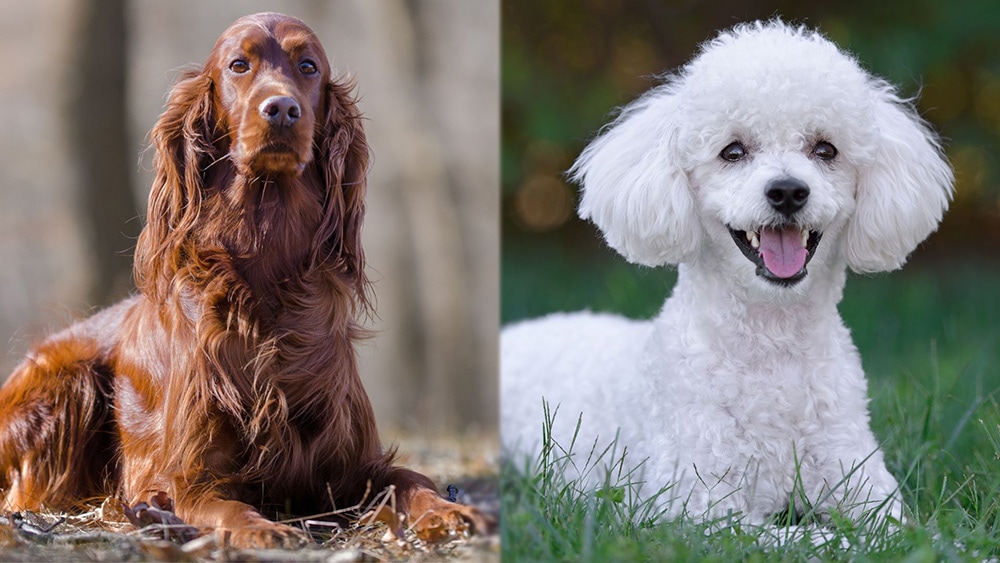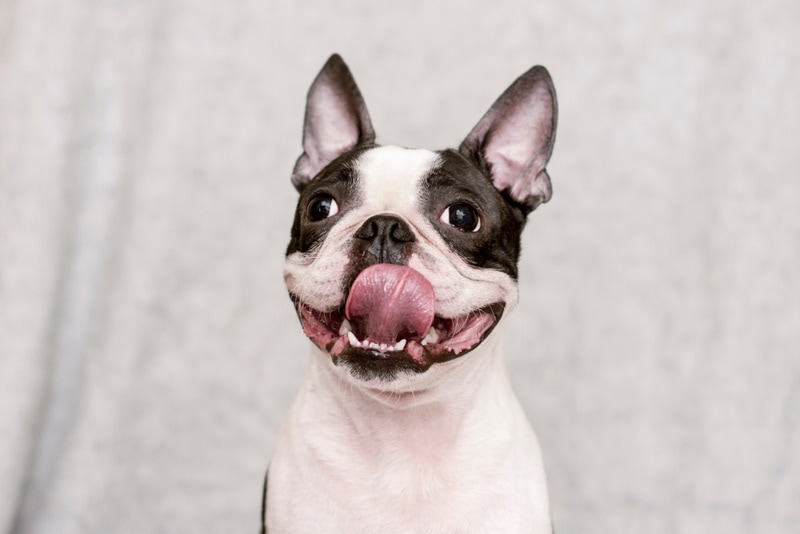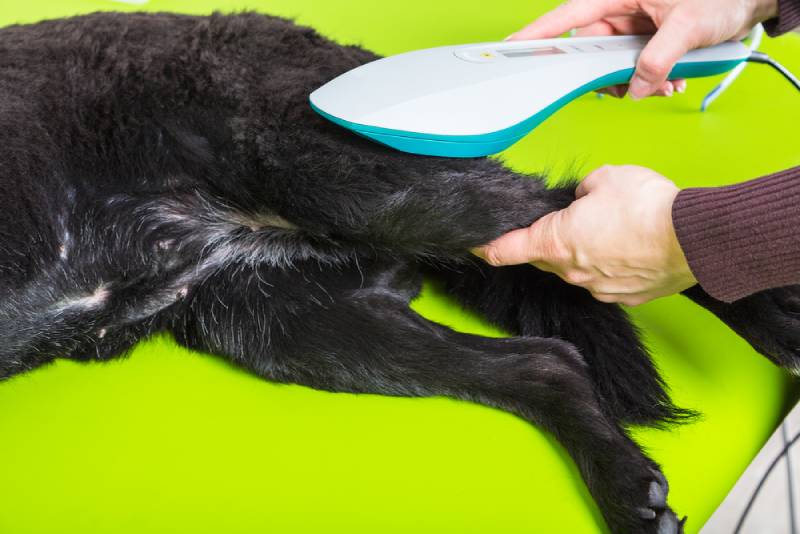Stinky Dog Face: Vet Reviewed Signs, Causes & How to Help

Updated on
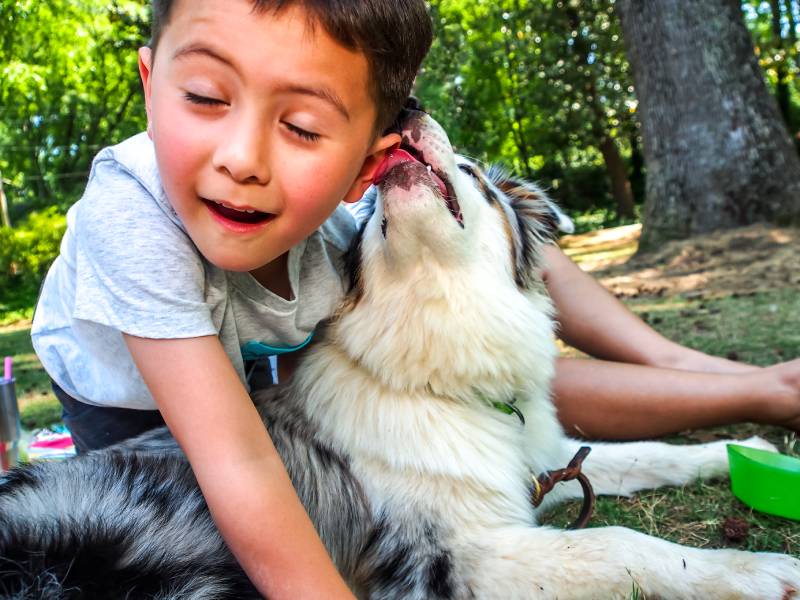
Click to Skip Ahead
When a dog licks your face, that’s the ultimate sign of affection. It’s like a gentle kiss from the fur baby! However, no matter how much you love receiving those licks, if the pet’s face has a bad odor, you’ll have a hard time enjoying their tongue all over you. That said, this is a very common issue, one that you should deal with promptly. So, why does the four-legged bud have a stinky face?
With most dogs, it can be the result of bad dental hygiene or crusty eyes, but the bad smell can also be caused by ear and skin infections or dirty fur. Thankfully, it’s not that hard to treat it once you and your vet figure out the root of the problem. And today, we’ll go over the signs, causes, and most effective treatments for the stinky face.
What Are the Signs of Stinky Dog Face?
The term “stinky dog face” is used to describe your pet’s face when it has a bad odor. Now, sometimes, a dog can have a meal for breakfast that smells funky or bury their face in the dirt: that’s totally normal for a curious, energetic doggo. But, if the smell doesn’t go away after a proper bath, then you have a problem on your hands. How should you handle this, then? Look for the causes instead of shying away from the dog’s affection and making them feel rejected.
A quick visit to a veterinarian will help determine exactly what’s going on with the pooch. First try and establish if the smell is coming only from their face or mouth, or is it present elsewhere or even everywhere on their body. It might be that the doggo is suffering from skin fold infection or pyoderma on their face, dental problems, ear infection or they may have a wound somewhere on their face under all that fur. If there is a general strong or unpleasant odor around your dog’s face as well as their whole body—particularly their back end—they may be experiencing issues with the digestive tract, an UTI (urinary tract infection), or impacted anal glands. That’s why it’s so important to get a vet to examine them. They will be able to inspect where the smell is coming from, and what’s going on with your pooch.
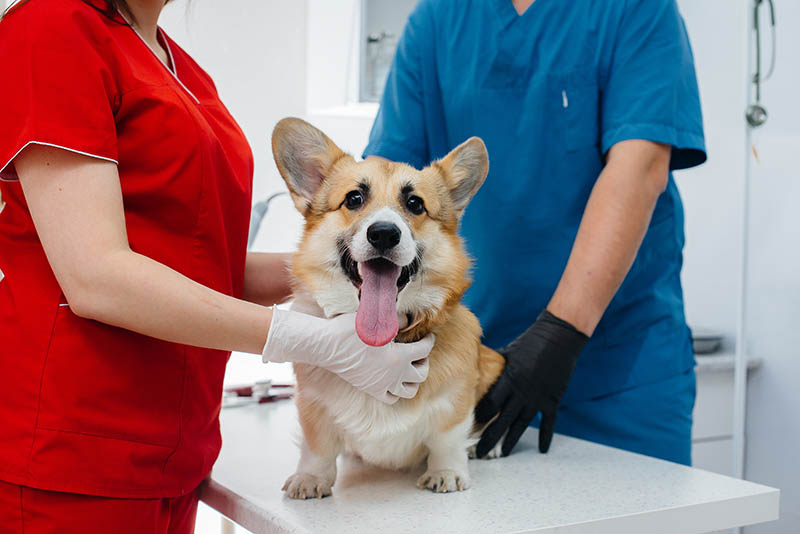
 What Are the Signs of a Stinky Dog Face?
What Are the Signs of a Stinky Dog Face?
The most obvious indicator here is going to be the bad odor. You’ll feel it the second the pet gets close to you. The smell will become even more apparent once they start licking you. It could be that the dog has bad breath; this is a very common cause of a smelly dog face. If there is calculus buildup on the pet’s teeth, you might be able to see it when the pooch opens their mouth. Inflamed gums is another sign to look for when you suspect dental problems.
In case of skin problems, red, hairless, moist or crusty areas might be seen. This could be caused by an allergy (mites, fleas, food or even pollen) or parasites. To make sure, schedule an appointment with a veterinarian. Also, don’t forget to take a closer look into the fluffy companion’s eyes. Do you see any goop/gunk there? If so, that’s a clear sign of a stinky dog face, along with redness and swelling. Lastly, look at the dog’s behavior.
Is the canine scratching their ears all the time and shaking their head? Do you see discharge coming out of the ear canals? That means they’ve got an infection. They cause our furry buddy discomfort, itchiness, emit bad odors, and can be very dangerous if left untreated. Thankfully, it’s not that hard to notice the signs if you know where to look. But what’s causing all these conditions? Could the smell be produced by dirty fur? Let’s talk about that next.
 What Are the Causes of Stinky Dog Face?
What Are the Causes of Stinky Dog Face?
1. Poor dental hygiene
Just like humans, dogs are prone to plaque buildup and calculus formation. And, over time, that leads to a foul smell. So, if your dog’s face stinks, most likely, it’s caused by bacteria accumulated in your dog’s mouth. Periodontal disease can be very common, and it is reported to happen in approximately 80% of dogs older than three.1 But that doesn’t mean that this is considered normal; it is usually caused by a lack of dental hygiene so visit your vet to get on top of the problem as soon as possible!
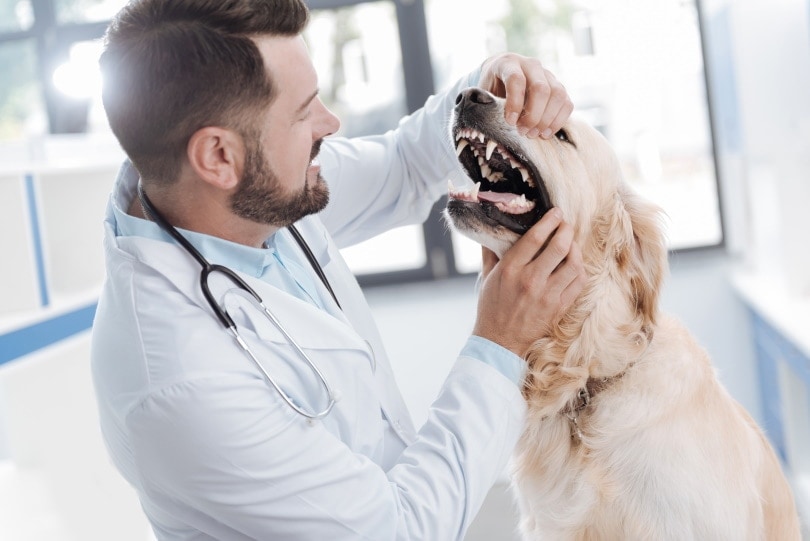
2. Dermatitis
Skin problems can be common in some dogs. As mentioned, they are often triggered by allergies or parasites. And when our dogs start scratching their skin, they actually make matters worse. By “peeling off” the skin, they create the best environment for bacteria and yeast colonization and overgrowth, and that causes the smell. Dermatitis needs to be treated ASAP. Otherwise, the pet will keep scratching the skin, leading to even more inflammation and infection. Dogs with excess skin folds and brachy breeds are more predisposed to skin infections or pyodermas in these areas on their face, and require daily skin fold hygiene.
3. Eye problems
Certain eye disorders in dogs lead to ocular discharge or epiphora (tear overflow). We’re talking about conjunctivitis, inward-growing eyelids, damaged tear ducts, and other issues. When the tears and mucoid discharge turn into crust around your dog’s eyes, they may generate a stinky smell. This is important: some dogs (usually the long-haired and short-nosed breeds) are more prone to these issues. It is vital to visit your vet if you notice this problem since the itchiness and discomfort can make your dog rub and scratch their face, resulting in severe problems such as corneal ulcers. Eye problems can be common in Shih Tzus, Pekingese, and Bulldogs.
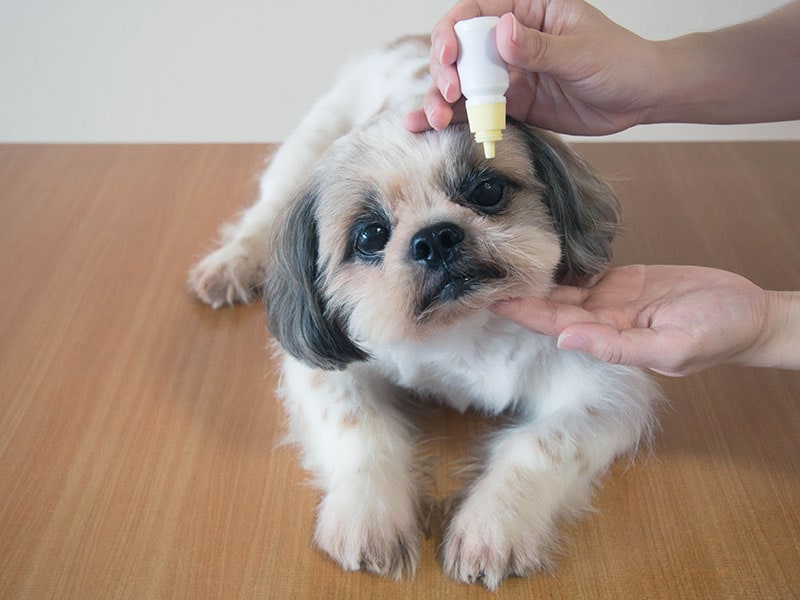
4. Ear infections
Dogs with floppy ears are highly susceptible to ear problems. In contrast, pups with short, pointy ears are at a lower risk. If your dogs like to swim, that can be another extra factor to consider. When left untreated, the bacteria/yeast thrive in the pet’s ear canal (moisture is the best “breeding ground” for it) and that’s where the bad odor comes from. To check for signs of infection, such as redness, swelling, discomfort and discharge, you’ll need to lift the pup’s ear and look inside, but they will still need to see your vet.
5. Dirty coat
If the dog has healthy teeth, ears, eyes, and skin, but the smell isn’t going away, go ahead and check the coat. Maybe it’s clean, just wet, and that’s what’s generating the funky odors.
 How Do I Care for a Dog With Stinky Dog Face
How Do I Care for a Dog With Stinky Dog Face
1. Clean the pet’s teeth
If the dog has bad breath, consult with your vet first, as your dog may be in pain or could require a dental procedure. Afterwards start by brushing their teeth regularly. Don’t use your own toothpaste for that, though, as it can harm the pet. Instead, invest in dog-specific paste and toothbrush. Dental chews and chew toys may help as well to a degree (by crushing some of that plaque), but they cannot replace regular brushing. It’s essential to practice daily dental homecare and have your vet check whether your dog needs to have their teeth cleaned by a professional.
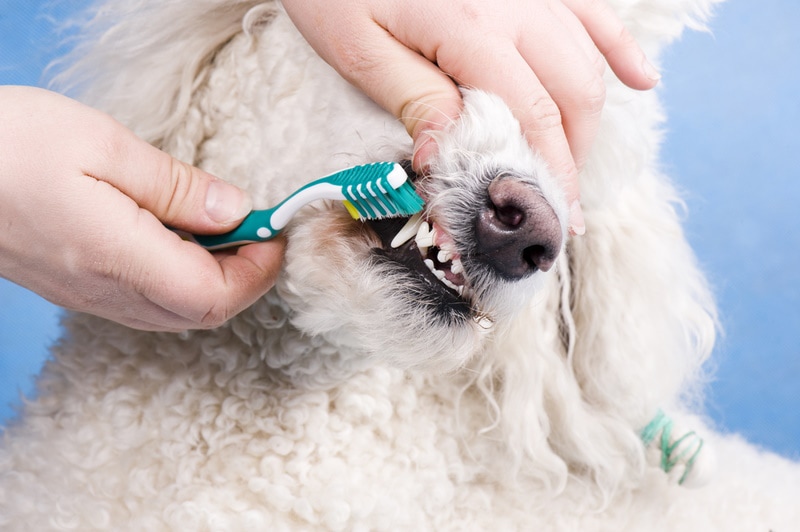
2. Use anti-parasite treatment and understand if your pet has an allergy
Speak to your vet about the best product to prevent and treat the most common external parasites in dogs: fleas, mites and ticks. If your vet diagnoses your pooch with an allergy, they will discuss possible treatment and management options with you, from food trials and hypoallergenic diets, specific treatments aimed to reduce the itching, immunotherapy and more. In some cases, a referral to a veterinary dermatologist is required. Your dog might need medication to control their itchiness and antifungal/antibiotic medication to deal with the infection. Also, the doctor will tell you what kind of shampoo to use back home.
3. Clean the area around the eyes
We all get crust in our eyes in the morning after a good night’s sleep; dogs might get a tiny bit as well. If you notice this, with no other signs of eye problems, you should clean them carefully with a soft cloth (soaked in warm water/salty water) or eye wipes for dogs. However, if your dog has an eye problem, which may exhibit as squinting, discomfort, rubbing the eyes, having constant daily or worsening eye discharge, that is usually thick or gunky, cloudiness, redness or any other sign, only a qualified veterinarian will be able to diagnose and treat the problem.
4. Ear cleaning and treatment
Have the dog checked at the local vet clinic. They’ll probably recommend a medicated ear drop and an ear cleaner to resolve the ear infection and inflammation, if that’s the cause of your dog’s bad smell. Topical medication, anti-inflammatory meds, and antibiotics might also be prescribed. It usually takes a few revisits to make sure the ear infection is successfully treated. In severe cases, veterinarians may recommend surgery, but this is normally after conventional treatment is unsuccessful. Make sure you contact your vet as soon as you notice the common signs of ear problems: head shaking, discomfort around the area, discharge, redness, or malodour.
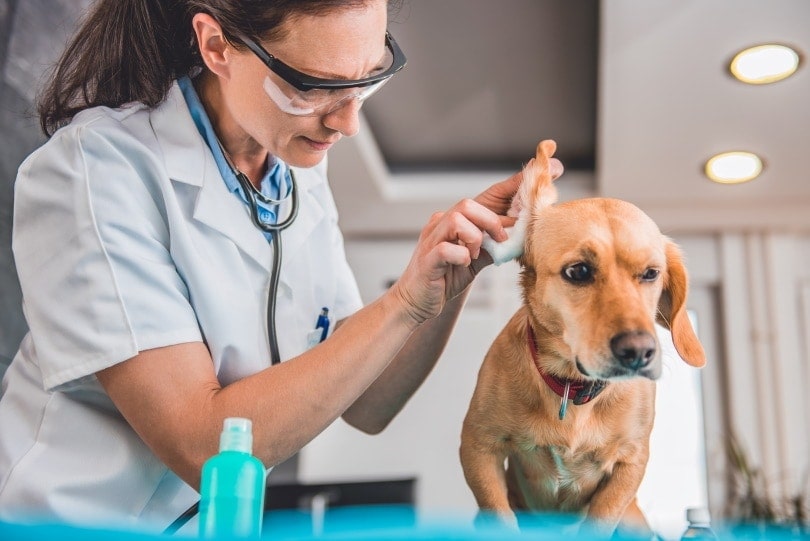
5. Wash the dog’s coat
There’s nothing hard about this one: regular baths should fix the problem. To ensure the smell goes away for good, ask a veterinarian to pick a shampoo for your pet.
 Frequently Asked Questions (FAQ)
Frequently Asked Questions (FAQ)
Is Stinky Dog Face Dangerous?
Yes, it can be dangerous if you don’t do anything about it. As we discussed earlier, bugs in the dog’s teeth, ear canals, and inside the skin are a disaster waiting to happen. To ease off the pain and help your furry friend avoid serious medical conditions (and hefty vet checks), make a habit of visiting veterinary clinics regularly for a thorough check. Fungi, bacteria, and parasites should always be taken seriously!
Can I Fix It on My Own?
Even if you managed to get rid of the stinky dog face by showering their coat, removing the crust, or cleaning their teeth, we still recommend paying the doc a visit. Often, home remedies are good for dealing with the consequences and the signs, yet not the root cause. So, make an appointment with a vet to make sure the dog receives proper medical attention. Most consultations don’t take that long (15–30 minutes or less) and won’t make the doggo feel uncomfortable.
Conclusion
If you’re the proud owner of an affectionate, cuddly doggo, you’ll be blessed with lots of licks and head rubs. Top that off with some rubs and gentle scratches, and the pet will answer with even more licks. Unfortunately, if the pooch has a stinky face, that can ruin those precious moments for the two of you. But don’t worry; this can be treated.
More importantly, the bad smell might be caused by a serious condition. So, don’t distance yourself from the pet. Instead, check their teeth, eyes, ears, and skin. Also, talk to your veterinarian about this issue. Chances are that the furry companion is suffering from an infection and needs your help to deal with it!
Featured Image Credit: Cat_Bee, Shutterstock


